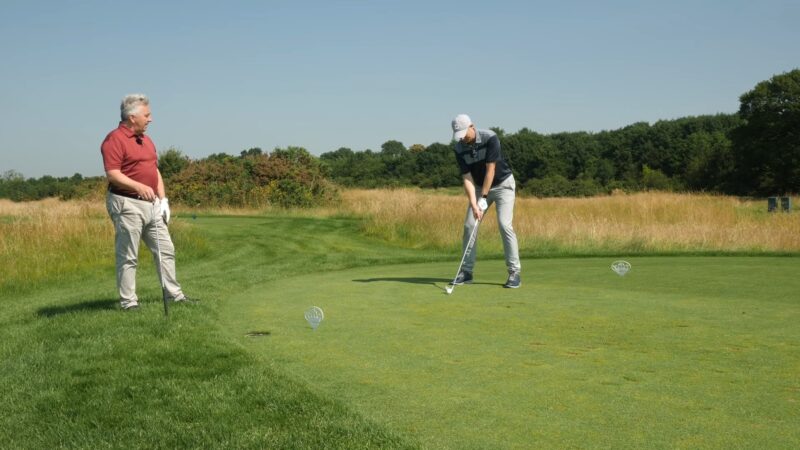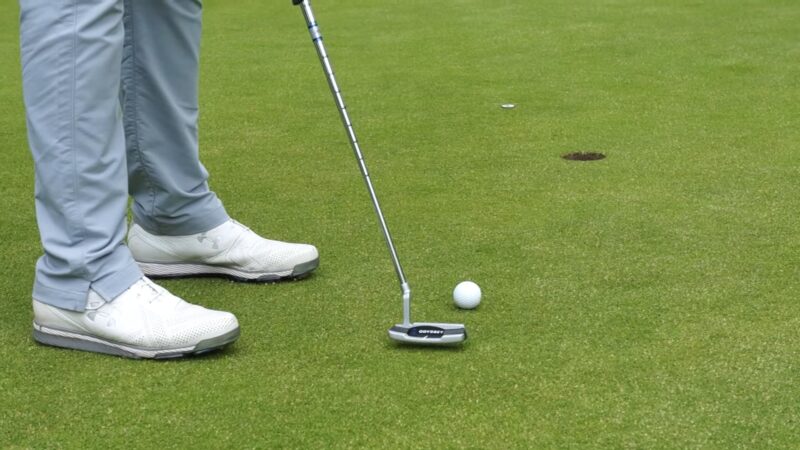

Welcome to the thrilling world of match play golf, a unique format that emphasizes strategy, competition, and excitement. Unlike stroke play, where the total strokes determine the winner, match play focuses on winning individual holes, making each a strategic battle.
This shift introduces a new level of excitement to the game, as players must constantly adapt to the evolving state of the match. Match play has been central to some of the most dramatic moments in golf history, pushing players to elevate their game under pressure.
Beyond the thrill of competition, match play emphasizes tactical decision-making, requiring players to anticipate their opponent’s moves and strategize accordingly. Whether you’re a seasoned golfer seeking a new challenge or a beginner learning the ropes, match play offers a unique, exciting way to experience golf.
Let’s dive into the captivating world of match play golf.

In the more commonly played stroke play, the winner is determined by the total number of strokes taken over the course of the entire round. Every stroke matters, and a single bad hole can have a significant impact on the final score.
A disastrous hole, where a player takes many more strokes than usual, can ruin an otherwise excellent round. In stark contrast, match play is all about winning individual holes.
The total number of strokes is irrelevant. A player could have a terrible hole, losing by ten strokes, but it only counts as one lost hole.
This fundamental difference makes match play a more forgiving format. It allows players to recover from mistakes more easily, as a bad hole doesn’t have a lasting impact on the rest of the match.
This aspect of match play encourages risk-taking and aggressive play, as players know they can recover from a bad hole.
In match play, the rules are simple and straightforward. Each hole is a separate contest, a one-on-one battle. The player who takes the fewest strokes on a hole is declared the winner of that hole.
If both players take the same number of strokes, the hole is considered halved, with neither player gaining an advantage. The match progresses in this manner, hole by hole, with players earning a point for each hole they win.
The player with the most points is leading the match. The match concludes when one player has won more holes than there are left to play.
For instance, if a player is 3 up with only 2 holes to play, they have won the match, as their opponent cannot catch up. This format of play creates a dynamic and exciting game, where the momentum can swing dramatically from hole to hole.
It’s a test of skill, strategy, and mental toughness, as players must navigate the challenges of each hole while also managing the overall state of the match.

In the strategic world of match play golf, there are advanced rules that add a unique layer of complexity to the game.
One of the unique aspects of match play is the ability for a player to concede a hole at any point during its play. This is often done when one player finds themselves in a position where they cannot win the hole, perhaps due to a particularly bad shot or an exceptional play by their opponent.
By conceding the hole, they effectively admit defeat for that particular hole and allow their opponent to claim it without completing their play. Conceding a hole isn’t just an admission of defeat, though. It can also be a strategic move, a part of the player’s larger game plan.
By conceding a hole early, a player can conserve their energy, both physical and mental, and focus on the upcoming holes. This can be particularly beneficial in long matches, where stamina and focus can become deciding factors.
It also allows a player to potentially disrupt their opponent’s rhythm, especially if they were on a roll.
Another interesting rule in match play is the ability for a player to pick up their ball without incurring a penalty, provided they cannot win the hole. This rule is another strategic element unique to match play.
If a player finds themselves in a situation where they cannot win the hole, they can pick up their ball, effectively conceding the hole, and move on to the next one. This rule not only saves time but also allows a player to conserve their energy for the remaining holes.
It also spares them the potential frustration of playing out a hole they cannot win, helping them maintain a positive mindset throughout the match. This rule, like conceding a hole, adds a layer of strategy to match play, allowing players to make tactical decisions based on the state of the match.
In certain situations, a player may give their opponent a free drop. This is often done when a ball lands in an unplayable position, such as in a water hazard or an area of thick vegetation.
The player can then drop the ball within two club lengths of where it landed, no closer to the hole, without incurring a penalty. This rule is another example of the strategic depth of match play.
By giving your opponent a free drop, you can potentially put them in a difficult position, especially if the drop area is not ideal. However, it’s a decision that must be made carefully, as it could also give your opponent an advantage if not executed properly.
If the match is tied after the agreed number of holes, the match goes into a sudden-death playoff. In sudden death, the match continues hole by hole until one player wins a hole.
The player who wins a hole in sudden death is declared the winner of the match. Sudden death is one of the most thrilling aspects of match play.
It’s a high-pressure situation where every shot matters and the smallest mistake can cost a player the match. It tests a player’s skill under pressure, their ability to make clutch shots, and their mental toughness.
It’s a fitting way to decide on a tied match, adding an extra layer of excitement and drama to the already thrilling format of match play.
In match play golf, your approach to the game can significantly influence the outcome.
In the realm of match play, adopting an aggressive approach can often yield significant dividends. Since each hole operates as an individual contest, taking calculated risks can lead to substantial rewards.
This format encourages daring play, such as attempting to reach the green in two on a par five or taking on a risky shot over a water hazard. These bold moves can result in winning a hole outright and can shift the momentum of the match in your favor.
However, it’s important to remember that aggression should be tempered with wisdom. Blind aggression can lead to unnecessary mistakes.
The key is to know when to be aggressive. Analyze the situation, consider the risks and rewards, and make an informed decision.
A well-timed aggressive play can catch your opponent off guard and swing the match in your favor.
Match play is a chess game on grass. It’s as much about strategy as it is about skill.
A well-thought-out game plan can often make the difference between winning and losing a match. Knowing when to be aggressive and when to play it safe, when to concede a hole, or when to make your opponent play out a difficult shot, can give you a significant edge.
Strategic decisions in match play extend beyond individual shots. They also involve managing the match as a whole.
Understanding the state of the match, knowing when to press your advantage or when to play conservatively, can have a significant impact on the outcome. A good match play golfer is not just a good golfer, but also a good strategist.
Understanding the rules of match play is crucial to success. The rules of match play differ significantly from stroke play and knowing these differences can give you a strategic advantage.
Knowing when you can concede a hole, pick up your ball, or give your opponent a free drop can affect the outcome of a hole and potentially the match. Despite the fact that many individuals tend to disregard them, comprehending match play etiquette is part of being knowledgeable about the rules.
Respect for your opponent, maintaining a good pace of play, and handling disputes in a fair and sportsmanlike manner are all part of the game. A good match player is not just skilled and strategic, but also respectful and fair.
Golf is a mental game, perhaps more so in match play than in any other format. Managing your emotions is key to maintaining focus and performing under pressure.
Stay calm under pressure, don’t let a bad hole get to you, and always keep a positive attitude. Remember, in match play, a bad hole only costs you one point.
Don’t let it affect your performance on the next hole.
Understanding your strengths and weaknesses is crucial in match play. Play to your strengths and be aware of your weaknesses.
If you’re a skillful putter, make sure to capitalize on your expertise, especially by incorporating aimpoint putting into your approach. Conversely, if you find it challenging to navigate long irons, it’s advisable to steer clear of situations that necessitate their usage.
Use your strengths to put pressure on your opponent and force them to play to their weaknesses.
Patience is a virtue in golf. Don’t rush your shots, take your time to read the greens, and always think through your strategy. Match play is a marathon, not a sprint.
Each hole is a battle, and the war is won one battle at a time. Stay patient, stick to your game plan, and wait for your opportunities.
Above all, remember to have fun. Golf is a game, and it’s meant to be enjoyed.
So, enjoy the challenge of match play, the camaraderie with your opponent, and the beauty of the golf course. Whether you win or lose, the experience of playing match play, the thrill of the competition, and the joy of playing the game are what truly matter.
If a match is tied after 18 holes, it typically goes into a sudden-death playoff. The first player to win a hole outright is declared the winner.
If a player breaches a rule during a match, the usual penalty is loss of hole in match play. However, the specific penalty can depend on the nature of the rule that was breached.
Yes, a match play game can end before the 18th hole if one player has won more holes than there are left to play. For example, if a player is 4 up and there are only 3 holes left, the match would end as it’s impossible for the other player to catch up.
Under the Rules of Golf, you are allowed to switch your golf ball at the start of each hole. However, during the play of a hole, you can’t switch your ball unless the rules allow it (like if the ball is damaged).
According to the Rules of Golf, a player is allowed to carry up to 14 clubs in their golf bag during a match
Match play, with its unique blend of strategy, competition, and excitement, stands as a captivating format of golf that offers a distinct challenge. This format, unlike the more commonly played stroke play, places a premium on winning individual holes rather than accumulating the lowest total score.
This shift in focus brings a whole new level of strategy and excitement to the game, making every hole a battle in itself.